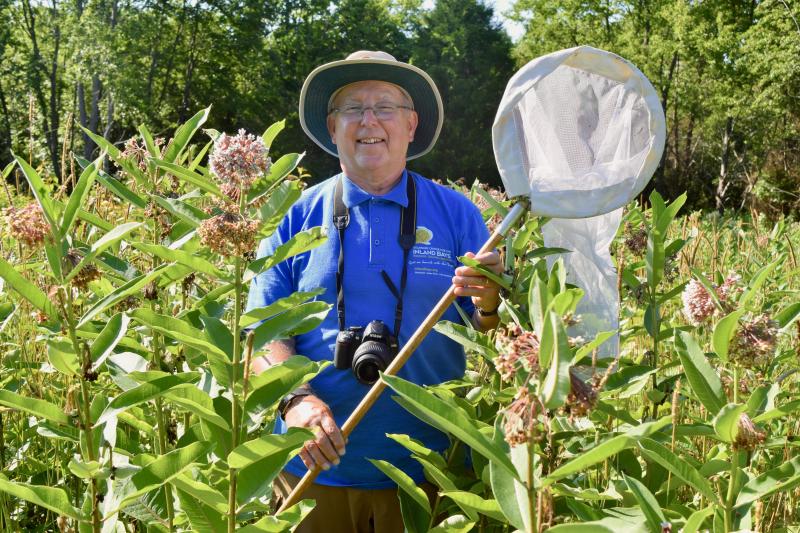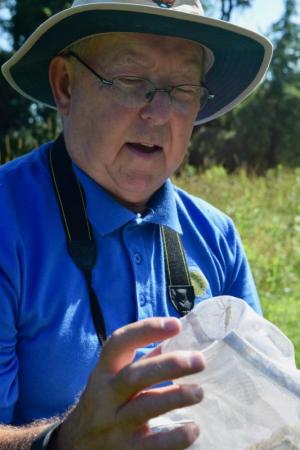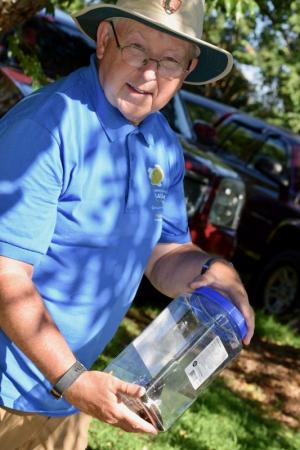Dennis Bartow fosters a love of the natural world
Dennis Bartow's eyes lit up as a viceroy butterfly fluttered across a path at James Farm Ecological Preserve in Ocean View. He dropped a bag of supplies and carefully treaded toward the colorful insect, which mimics a monarch to avoid a fate as someone else's lunch.
Bartow tip-toed toward the butterfly as it landed on a large leaf and then expertly scooped it up in his net. “It's a veritable collecting haven,” he said, pointing to the milkweed beetles, robber flies and Japanese beetles searching for a snack.
Bartow has been collecting bugs for about 50 years. Some of his rarest finds are stored at the Smithsonian, but thousands more are at his home on Salt Pond near Bethany Beach. The James Farm Preserve, where he has taught more than 12,000 Indian River School District students through an educational program with the Delaware Center for the Inland Bays, is the perfect place to spot native arthropods, he said.
“I'm known among the relatives as the bug guy,” he said with a soft laugh. He explained the difference between honey bees and bumblebees with ease, intermittently spouting off the Latin names of several species that flitted past.
But there's still one critter that eludes the living, breathing field guide to bugs of southern Delaware: The Bethany Beach firefly. The species unique to Delaware is only found along a small stretch of coastal wetlands near Bethany, Bartow said, and he’s hoping to one day stumble upon that secret space without asking for help. The firefly, discovered in 1949, can only be found at two places where rare interdunal wetlands exist, according to state wildlife experts.
“I'm a person with an innate curiosity,” he said. “I love to learn, read and get out. Oh, and I'm the genealogist for the family, too.”
The Pennsylvania native's love of nature was nurtured by his parents, George Pierce Bartow, who grew up in the Depression and later worked at DuPont, and Berneice Bartow, a librarian.
“They were always role models for us,” Bartow said. “One of my fondest memories was being at his chair when he was reading. He was also our Scout leader and one of the reasons I became an Eagle Scout.”
A childhood of camping and trips to the beach fueled Bartow's curious nature, and sparked a life of education. Bartow, who holds a master's degree in biology and a doctorate in educational leadership, spent nearly 40 years as a teacher and administrator in Pennsylvania public schools and as an adjunct instructor at Neumann University. He retired to southern Delaware in 2008.
As he was saying farewell to his Pennsylvania home, a newspaper ad caught his attention. The James Farm Ecological Preserve was looking for an instructor, who would teach middle schoolers about soil science, water quality, coastal ecosystems and the creatures that inhabit them.
“So I said, 'why not?'” Bartow said. “Teaching becomes your life.”
Bartow said, after he was hired by the Delaware Center for the Inland Bays, he was thrilled to find himself calf-deep in bay water, studying and teaching a new generation about the ecosystems and animals he previously only encountered in textbooks.
“You just have to be yourself,” he said, admitting that seventh-grade students are a different animal. To catch their rebellious attention, whenever Bartow spotted the egg mass of a lugworm – a light-colored gelatinous blob commonly found along the edge of the bay, he’d smirk and tell them: “It's whale snot.” He said the kids would squeal in disgust before he could carefully explain what they're actually looking at.
“What never ceases to amaze me is a lot of these kids have never even touched a fish,” he said.
Bartow is a dedicated volunteer and the center’s senior naturalist, leading the nonprofit organization's annual horseshoe crab counts and fish surveys.
He also hopes to someday complete work that began in 1970, when he had a brief stint as a seasonal ranger naturalist at Yellowstone National Park. There he studied the insects capable of withstanding the high temperatures of hot springs. He has his eye on a possible trip out west in the near future to continue his field work.
Bartow said his real inspiration is his wife of 50 years, Anne, whom he met on his first day of college at West Chester University. He distinctly recalled first spotting Anne while they were both on a train headed to class. They parted ways, but as a younger Bartow wondered exactly where he was supposed to go, his future wife stepped in to guide him.
“We were inseparable from there,” he said. It was Anne's family that soon introduced Bartow to the Delaware beaches. “Everything I have done I was able to do because of her,” he said, adding that Anne was recently diagnosed with Alzheimer's disease and now lives at Harrison House in Georgetown.
Their children, Amy and Meg, also picked up Bartow's love of squirmy creatures, and even the Bartow grandchildren are members of the Young Entomologists Society in Washington, D.C. “My kids have their own bug boxes,” he said, beaming with pride.
The 72-year-old said he has no plans to slow down and is eager to continue adding to the thousands of specimens in his own insect collection. “I'm a lifelong learner,” he said. “When I stop wanting to learn, that's probably when I'll be dead.”





























































